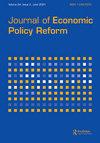Introduction: Revisiting the Role of State-Owned Enterprises in Strategic Sectors
IF 3.2
3区 经济学
Q1 DEVELOPMENT STUDIES
引用次数: 0
Abstract
ABSTRACT A few years after the fall of the Berlin wall, the World Bank published Bureaucrats in Business, an influential report on State-Owned Enterprises (SOEs) that provided a road-map on how to reform - or privatize - those “loss making state-owned-enterprises that are a significant burden on government budgets and […] hinder growth, impede market liberalization and thus both directly and indirectly limit efforts to reduce poverty” (World Bank, 1995, p. ix). Some 25 years later SOEs are still pervasive. This special issue follows up on Bureaucrats in Business, and sheds light on the continued important phenomena of SOEs and attempts to understand what the perception is about the role that SOEs should play both in tranquil and in turbulent times. We firstly set out an overview of the presence of SOEs over time and across sectors and country groups). Because the topic of the role SOEs should play in the economy is influenced by politics, second, we summarize the results of a Delphi study that presents new consensus on SOEs according to experts. Third, we then review the linkages between ownership and performance in the infrastructure and financial sectors. Fourth, we shed light on the new phenomenon of SOEs abroad, and then conclude.引言:重新审视国有企业在战略领域的作用
摘要柏林墙倒塌几年后,世界银行出版了《商业官僚》,一份关于国有企业的有影响力的报告,为如何改革或私有化那些“亏损的国有企业提供了路线图,这些企业是政府预算的重大负担,[…]阻碍了增长,阻碍了市场自由化,从而直接和间接地限制了减贫的努力”(世界银行,1995年,第九页)。大约25年后,国有企业仍然普遍存在。这期特刊继续关注商业官僚,揭示了国有企业持续存在的重要现象,并试图理解人们对国有企业在平静和动荡时期应该发挥的作用的看法。我们首先概述了国有企业在一段时间内、跨部门和国家集团的存在)。由于国有企业在经济中应该扮演的角色的主题受到政治的影响,其次,我们总结了德尔菲研究的结果,该研究根据专家的意见对国有企业提出了新的共识。第三,我们随后审查了基础设施和金融部门所有权与绩效之间的联系。第四,我们对国外国有企业的新现象进行了分析,并得出结论。
本文章由计算机程序翻译,如有差异,请以英文原文为准。
求助全文
约1分钟内获得全文
求助全文
来源期刊

Journal of Economic Policy Reform
Multiple-
CiteScore
6.60
自引率
0.00%
发文量
14
期刊介绍:
The Journal of Economic Policy Reform focuses on the analysis of economic policy reform. The journal draws upon what lessons can be learned from the successes and failures of countries undertaking reforms and how existing theories can be developed to shed light on positive as well as normative aspects of the reform process. The Journal of Economic Policy Reform encourages work from economists and political economy analysts on policies to promote growth and reduce poverty, intellectual property rights, aid versus trade, debt and debt relief, taxation and social security systems, surveys of key reform issues, as well as on corruption, democracy, emerging markets and the role of multilateral institutions.
 求助内容:
求助内容: 应助结果提醒方式:
应助结果提醒方式:


